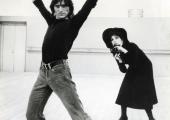Kate McGarrigle, 1946-2010

The Canadian matriarch of folk music remembered
I’m no folky but I fell for the songs of Kate and Anna McGarrigle the moment I first heard their album Dancer with Bruised Knees, and it’s remained a companion ever since. It never struck me that their songs and the eclectic backing music was "folk", as it was often categorised; the tag presumably arose from Kate’s accordion and banjo playing, their acoustic guitars and, of course, the French-Canadian chansons they sang at home as children - and thankfully introduced to the rest of us.
 But regardless of definitions, when Kate sat at the piano and Anna played guitar, or they swapped places and instruments, as far as I was concerned, they were simply fine musicians with strong, distinctive voices, and their songs were personal, quirky, poignant and poetic. Kate’s high, sharp pitches were matched by her unpredictable capacity to burst into shrill open-mouthed laughter onstage and set off Anna and the whole band, and the audience with it. Her quick, droll humour was evident in their between-songs banter, which presumably started when they were children. But singing was a serious business, and rising together, their voices created exquisite, unusual harmonies possible because of those long, close, intuitive connections. Floating above the room, they wove translucent sculptural shapes which swelled into richer, more substantial forms or separated off on different currents before coming together again. It’s unbearably sad to imagine the remaining voice singing alone.
But regardless of definitions, when Kate sat at the piano and Anna played guitar, or they swapped places and instruments, as far as I was concerned, they were simply fine musicians with strong, distinctive voices, and their songs were personal, quirky, poignant and poetic. Kate’s high, sharp pitches were matched by her unpredictable capacity to burst into shrill open-mouthed laughter onstage and set off Anna and the whole band, and the audience with it. Her quick, droll humour was evident in their between-songs banter, which presumably started when they were children. But singing was a serious business, and rising together, their voices created exquisite, unusual harmonies possible because of those long, close, intuitive connections. Floating above the room, they wove translucent sculptural shapes which swelled into richer, more substantial forms or separated off on different currents before coming together again. It’s unbearably sad to imagine the remaining voice singing alone.
 I played Dancer with Bruised Knees over and over, partly for the lyrics which I always assumed had autobiographical undercurrents, but also because of how its songs linked to my own experiences. The title track depicts a dancer feeling safe that her partner would always catch her - until he let her down. Hence the bruised knees. We’ve all been there, and that includes Kate’s experience with her former husband, Loudon Wainwright III. "First Born" - about her son Rufus, surely? - tells of a mother’s silver-spoon treatment of her boy. Its universal appeal is one of the key attractions of her songs. I still find "I Eat Dinner" an almost unbearable description of a solitary life and of eating alone. When she sings “I eat leftovers with mashed potato” she’s almost mocking the curious habits lone diners develop, and with “No more candle-light, romance, small talk… I never thought it would end up this way,” she conjures a bereaved or divorced eater (herself after the Wainwright separation?) - and that single place-setting. Even if you’re locked in coupledom, there’s always a widowed mother or divorced friend waiting to appear before you as you listen.
I played Dancer with Bruised Knees over and over, partly for the lyrics which I always assumed had autobiographical undercurrents, but also because of how its songs linked to my own experiences. The title track depicts a dancer feeling safe that her partner would always catch her - until he let her down. Hence the bruised knees. We’ve all been there, and that includes Kate’s experience with her former husband, Loudon Wainwright III. "First Born" - about her son Rufus, surely? - tells of a mother’s silver-spoon treatment of her boy. Its universal appeal is one of the key attractions of her songs. I still find "I Eat Dinner" an almost unbearable description of a solitary life and of eating alone. When she sings “I eat leftovers with mashed potato” she’s almost mocking the curious habits lone diners develop, and with “No more candle-light, romance, small talk… I never thought it would end up this way,” she conjures a bereaved or divorced eater (herself after the Wainwright separation?) - and that single place-setting. Even if you’re locked in coupledom, there’s always a widowed mother or divorced friend waiting to appear before you as you listen.
The McGarrigles’ audiences always had a strong female presence. Over the years, I felt that their lives, as sung about, moved and changed in parallel with my own, and judging by the cheers and laughter, they certainly chimed with many in their audiences. At first, their appeal for me was partly seeing two women playing instruments, singing mostly their own songs, and running the show - up there and in control. Their interactions were fascinating and unusual: confidently letting private jokes catch in the microphone as they tuned up, little asides about how they looked, and in later years, mocking themselves lightly for their new glam look, the sparkly scarves and glinting ear-rings and that once taboo accessory for us feminists, lipstick. It was a way of unselfconsciously and effortlessly drawing us into the close web they created between themselves; that’s how they transformed every concert hall into a family living room much like the one at home where they sang with their parents as kids, and Kate repeated with her own.
 My favourite McGarrigle memory is the concert at the Royal Festival Hall in London, where Kate introduced Martha for the first time (pictured, from left: Martha Wainwright, Joan Baez, Emmylou Harris, Kate McGarrigle, Bruce Cockburn, Anna McGarrigle and Rufus Wainwright). The awkward teenager in a mini-dress shifted around on long skinny legs like a nervous colt, kept moving around her mum for reassurance, and then when she sang, bending and writhing her legs – as she still does in her marvellous performances with her own band – she let go of a voice so mature, it was ready for the world. Her mother listened with eyes shut then she joined her, making their own, quite different harmonies from those with Anna.
My favourite McGarrigle memory is the concert at the Royal Festival Hall in London, where Kate introduced Martha for the first time (pictured, from left: Martha Wainwright, Joan Baez, Emmylou Harris, Kate McGarrigle, Bruce Cockburn, Anna McGarrigle and Rufus Wainwright). The awkward teenager in a mini-dress shifted around on long skinny legs like a nervous colt, kept moving around her mum for reassurance, and then when she sang, bending and writhing her legs – as she still does in her marvellous performances with her own band – she let go of a voice so mature, it was ready for the world. Her mother listened with eyes shut then she joined her, making their own, quite different harmonies from those with Anna.
Kate McGarrrigle died of sarcoma, a type of cancer, on 18 January, at her home in Montreal. She was 63. Anna sent an email message out to the world that "she departed in a haze of song and love surrounded by family and good friends". They were packed into her room, singing to her as she slowly passed through onto that mysterious journey. Her departure, of course, leaves a terrible space in the songs which Anna will have to reconstitute, but with Martha’s new baby and her own and Rufus’s voices assured and loved, Kate died knowing that the void would be filled in a different, bright and certainly a McGarrigle way.
Official website of the McGarrigles.
Overleaf: watch a clip from a documentary about the McGarrigles



